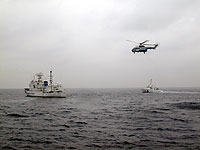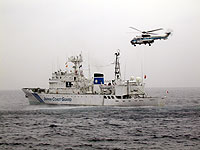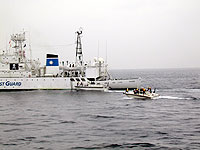The Proliferation Security Initiative (PSI) Maritime Interdiction Exercise
"Team Samurai 04"
(Overview and Evaluation)
October 28, 2004
 |
 |
 |
1. Overview
(1) Itinerary
| October 25 (Monday) | Pre-Exercise Meeting on the Scenario-based PSI Maritime Interdiction Exercise (Venue: Yokohama Maritime Disaster Prevention Base) |
| October 26 (Tuesday) | Scenario-based PSI Maritime Interdiction Exercise (Venue: Off the coast of Sagami Bay) |
| October 27 (Wednesday) | Post-Exercise review meeting on the Scenario-based PSI Maritime Interdiction Exercise (Venue: Yokosuka district of Japan Maritime Self-Defense Force) Maritime interdiction activities Training demonstration (Venue: Within the port of Yokosuka (Note)) |
(Note) Originally scheduled to be conducted off the Port of Yokosuka, but took place within the port due to conditions at sea.
(2) Details of participation from Japan
| (a) | Ministry of Foreign Affairs: Overall coordination concerning itinerary, participating assets, scenario and others. |
| (b) | Japan Coast Guard: Execution of law enforcement activities on suspected vessels such as pursuit, stopping, boarding, searching and seizure during the scenario-based PSI maritime interdiction exercise. |
| (c) | Japan Defense Agency and Japan Self-Defense Forces: Execution of guard and surveillance activities such as search and monitoring by vessels and aircraft during the Scenario-based PSI maritime interdiction exercise. In addition, execution of the maritime interdiction activities training demonstration. |
(3) Participating Countries: 22 countries in total
- Countries participating with assets such as vessels and aircraft: 4 countries (Japan, Australia, France, and the United States)
- Countries participating as observers: 18 countries (Cambodia, Canada, Greece, Germany, Italy, the Netherlands, New Zealand, Norway, the Philippines, Poland, Portugal, Russia, Singapore, Spain, Sweden, Thailand, Turkey, and the United Kingdom)
<Points>
- All 15 PSI core group countries took part in the exercise in one form or another. (Japan, Australia, France and the United States provided vessels and aircraft while the other eleven countries dispatched observers.)
- In addition to Singapore which is already a member of the core group, Cambodia, the Philippines and Thailand participated for the first time from Asia.
- The United States dispatched high-level officials as its observers including Under Secretary for Arms Control and International Security John Bolton.
(4) Overview of the exercise scenario
- Under the circumstance of a possible terrorist attack in Japan by a certain terrorist organization, the government obtains information that a suspected Japanese vessel is going to receive a cargo suspected to be sarin-related from a suspected US vessel. The strengthening of information gathering system is confirmed at the Prime Minister's Official Residence. Japan Coast Guard obtains a search/seizure warrant for the suspected Japanese vessel.
- A patrol aircraft of Japan Self-Defense Forces identifies a inspected US vessel on the high seas and reports to the relevant authorities. Japan Self-Defense Forces and Japan Coast Guard continue surveillance activities.
- The suspected Japanese vessel approaches the suspected US vessel and the crew of each vessel start transshipping the material in question on the high seas. Japan Coast Guard patrol vessels attempt to approach the vessels, but both vessels suspend the transshipment of the material and flee from the scene.
- Japan Coast Guard patrol vessels stop the suspected Japanese vessel on the high seas and identify the material in question as a result of boarding and searching. On confirmation that the material is sarin by a sample check, the material is seized. The Japanese vessel is diverted to the nearest port. As a result of an expert examination, it becomes definite that the material is sarin. The suspects are sent to the prosecutor's office.
- Based on the information provided from Japan Coast Guard and Japan Maritime Self-Defense Force, the US vessels start the pursuit of the suspected US vessel on the high seas, as do the Australian and French vessels at the request of the US. The US vessel stops the suspected vessel on the high seas. The US calls for support of the Australian and French ships in conducting search of the material in question, and secures it as a result of the joint search. The US conducts an examination of the material and as a result of comparison of the data with that of Japan Coast Guard, it becomes definite that the material is sarin. The material is seized.
(Note) Proliferation Security Initiative (PSI)
- PSI is an effort to consider collective measures among the participating countries, consistent with national legal authorities and relevant international law and frameworks, in order to impede and stop prevent the proliferation of weapons of mass destruction, missiles and their related materials that pose threats to the peace and stability of the international community. It was announced by US President George W. Bush in May 2003.
- The PSI participating countries have held plenary meetings at director-general level and experts meetings at deputy director-general level.
- At present, 15 PSI core group countries are: Japan, Australia, Canada, France, Germany, Italy, the Netherlands, Norway, Poland, Portugal, Russia, Singapore, Spain, UK, and US.
- Japan has actively participated in the activities of the PSI which is in line with the efforts Japan has made for non-proliferation of weapons of mass destruction and missiles.
2. Evaluation
| (1) | Improvement was seen in the proficiency level of maritime interdiction of relevant authorities (navy, coast guard, customs) of countries that provided their vessel and aircraft for this exercise (Japan, Australia, France and the United States), and coordination was strengthened. |
| (2) | All 15 PSI core group countries took part in the exercise in one form or another. (Japan, Australia, France and the United States provided vessels and aircraft while the other eleven countries dispatched observers.). This demonstrated an international partnership towards the interdiction of proliferation with the PSI core group playing a central role. |
| (3) | This interdiction exercise is the first PSI interdiction exercise Japan has hosted and it highlighted both domestically and abroad the active contribution Japan is making for PSI. |
| (4) | In addition to Australia and Singapore that are already member countries of the core group, Cambodia, the Philippines, New Zealand and Thailand from the Asia-and Oceania region participated for the first time in the PSI interdiction exercise. The understanding regarding the PSI among Asia Oceania Countries was promoted through the implementation of the exercise (outreach effect). |
Back to Index
